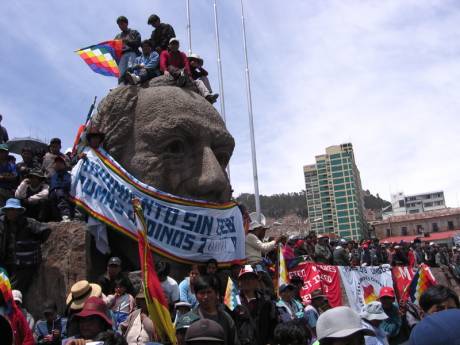Bolivian Land Reform: La Pazīs Streets Become A Theatre of Power.
 international |
anti-capitalism |
news report
international |
anti-capitalism |
news report  Thursday November 30, 2006 01:10
Thursday November 30, 2006 01:10 by D'other
by D'other La Paz
La Paz
Hurriedly returning from negotiations with the Shell executive in Holland, Evo Morales last night granted accession to a law of agrarian reform leading many of La Pazīs morning tabloids to carry headlines claiming he had declared war on the latifundia dominating the country's system of land distribution. In Santa Cruz and Beni, regions dominating 80% of the Bolvian economy, as little as 14 families hold over 3m hectares of unproductive grounds in their hands. This new land reform facilitates removing this land from idle hands and redistributing it to campesinos, similar perhaps to legislation facilitating the placing of unproductive factories into the hands of workers in Argentina. The passing of the law was accompanied by the arrival of marchistas from across the country as an excercise in popular support for the land reforms.
Bolvian Indymedia carries a series of photos from the assembled organisations of the indigenous supported by urban based trade union federations as they were addressed by Morales in the Plaza de San Francisco. After the speech the crowd split with some marching towards a university building where students greeted them with a banner drop from the roof saluting their struggle, before providing some food and refreshment. A smaller contingent went straight towards the parlimentary buildings in around Plaza Murillo, carrying traditional Aymara wiphala flags and marching in regional contingents under the banners of the MST (Movement Without Land) and other indigenous national organisations.
Most of these organisations regrouped later in the evening and from the same square oversaw the actions of the senate late into the night. Eventually Morales signed the law into effect in his characteristic casual wear of a leather jacket with some woven artisan touches. Beeping cars greeted the cheers of campesinos across the city as the Bolivian National TV service chimed in on the historical significance of the day that passed, while its cameras panned in on banners of the agrarian struggle strewn over the balconies of the senateīs public gallery.
The vigilance around the senate was convened yesterday alongside the demonstration earlier by the MAS (Movement Towards Socialism). In the past week Bolivia has been captivated by what parts of the press have called a "social crisis" with others sensationally and hysterically pointing towards a civil war. Members and supporters of right wing parties have gone on a hunger strike led being led by the owner of Bolivia's Burger King franchise in opposition to the reforms being pushed by the MAStistas. Last week more seriously witnessed a large demonstration in right wing strong hold Santa Cruz, an event surrounded by a dangerously developing discussion on seeking autonomy from the MAS parliament. Santa Cruz is where the main private media is located and also not surprisingly where the oligarchs and their wealth are largely concentrated.
More immediately grevious from the point of view of passing the land reform act was the boycott called by opposition parties in an effort to undermine the quorum required to pass the act. On Monday campesinos that had surrounded a meeting of dissenting non-MAS regional prefects in Cochabamba were gassed by police and attacked by a youth organisation related to one of the right wing parties. MAS is clear on the need for more excercises of power in the streets in opposition to the moves of the right, "if the marches put order in the Senate, now it is necessary to put order in the Constituent Assembly." The Constituent Assembly is where the Bolivian constitution will be subject to a process of revision and rewriting, a process open to potential frustration by the political right. This is why the streets are important. The mobilised mass expression of political will on the streets has been where power has lay in recent Bolivian history, evidenced in the Water War and right up to the Gas War that brought Morales to power.
Despite the street theatrics of yesterday Morales insists his party the MAS is a state based legislating instrument of the social movements from which it seeks sanction for its political reforms. This was reflected in comments yesterday outside the historic Fransican monestry in the centre of La Paz, when he described how "legally, constitutionally, we will end the large estate. We will not take by the force earth but with the law in the hand." Some obsevers however have commentedthat the recent electoral success of MAS has forced closure in social movement debates in Bolivia on paths to revolution less reliant on the state as a lever of change. Prominent in these critiques is the view that the legislation used to convoke a constituent assembly has re-legitimised the role of right wing parties, something torn away from them in recent popular uprisings. As a form of representative democracy this law also removes any possiblity for the direct representation of social movements in the process of re-drawing the constitution leaving them instead to jockey for position with MAS in an increasingly cliental based politics.
Two blogs both taking their names from Eduardo Galeano and worthy of note for their coverage of where power and social movements clash in Latin America are Upsidedownworld and Openveins. Pay attention to both of them for more coverage on the situation in Bolivia.
